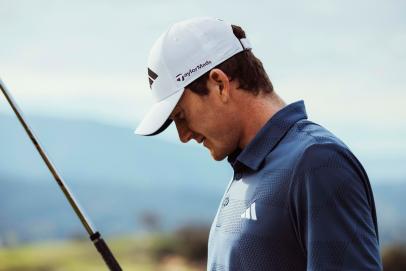editor's letter
Why Nick Dunlap is a smart kid leaving college to turn pro

Orlando Ramirez
Our cover star has the rare distinction of being the only golfer ever to win his way out of playing Augusta.
The reigning U.S. Amateur champ had a personal trip to Augusta National lined up for February, but winning The American Express in January threw a wrench. After the rhetorical decision to turn pro and get two years fully exempt PGA Tour status, Dunlap then had four days to finalize all the details—agent, team, clothes, logos, starting schedule, a photoshoot with Golf Digest—things the sophomore finance major always figured he’d handle after he graduated in three years by taking 18 credits each semester. Every evening that manic week, he walked the University of Alabama track alone with earbuds playing music, a small dose of Zen to cope with realizing his dream so soon. Playing for $20 million back-to-back weeks wouldn’t suck, and of course he’d get another chance to see Augusta National for the first time before his Masters debut, but, man, it all happened so fast.
Speaking of fast, Dunlap had a golf club in his hands for the first time at 7 and by age 12 shot 59. Only Tiger Woods also won the U.S. Junior and U.S. Amateur, and only Jordan Spieth won a tour event younger. And both those guys had hardcore golfing dads. Jim Dunlap played college baseball and wife Charlene ran track, which partly explains the perfect athletic frame on a kid who orders a cheese quesadilla with onion rings for lunch.
Maybe it’s an inner hunger that makes Nick so special. When he was 10, he got in trouble for going AWOL at camp in search of pizza. He didn’t like what was served, so he walked alone to a trafficky strip mall at 9:30 p.m. Camp director Jay Seawell, also the golf coach at the University of Alabama, dished a stern lecture to the youngster, then never stopped recruiting him.

Kennett Mohrman
From the Dunlap residence in Birmingham, it was a safer amble to Greystone Golf and Country Club. Jeff Curl had Korn Ferry Tour status when he found himself on the range next to the precocious sportsman, whose reputation in junior baseball and football was making the rounds. “It’s pouring rain, just me and him, and I decide I’m not going to leave before a 10-year-old does,” Curl says. “Nick’s determination, the way his mind works, he could’ve gone pro in any sport—or been a CEO.”
An only child, Dunlap started hanging with Curl at all hours. “He probably missed more school hunting than he should’ve,” laughs Curl, who tells a good story of the time he gave 12-year-old Nick an unsighted rifle, and Nick returned with a bobcat. As for games against the local contingent—pros like Sepp Straka, Trey Mullinax, Lee Hodges—Curl says he “consciously tried to put Nick in awkward situations.” That included having Nick caddie for him at U.S. Open qualifying when Nick was 14. “Most guys don’t want a kid around in that situation. I said, ‘Gentlemen, only one person in this group is gonna win a major, and today he ain’t playing.’ ”
Shelves collapsing with medals, qualifying for the national Punt, Pass, and Kick, taking deer with trophy racks—these are things that might swell a boy’s head. Despite all the talent Seawell has witnessed, what stood out with Dunlap was his “coachability,” which is another word for humility. An eagerness to learn and be directed. It was a puppyish demeanor that certainly fit the phase when he was growing into his size 12 feet and later, perhaps more crucially, the vulnerability Dunlap brought in conversations with University of Alabama consulting psychologist Dr. Bhrett McCabe, who penned our cover story with Digital Editorial Director Sam Weinman. A takeaway: The notion that great golfers conquer their emotions with ice water in their veins is bull.
“I’m an adrenaline junkie,” Dunlap says, whether that’s staring down an eagle putt or a buck from behind a bow. He doesn’t bother with rifles much anymore. “To me that’s not hunting; that’s just killing.”
All you big game on tour, watch out. This guy likes being nervous.

